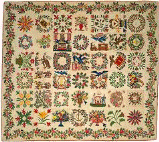Textile Society of America

Textile Society of America: Symposium Proceedings
Date of this Version
2002
Document Type
Article
Citation
Published in Silk Roads, Other Roads: Textile Society of America 8th Biennial Symposium, Sept. 26–28, 2002, Smith College, Northampton, Massachusetts.
Abstract
The Silk Route has become synonymous with the movement of knowledge that accompanies the trade of objects. Many of the textiles discussed here were not traded along the Silk Route, but all are representative of the associations that are made with this artery of cultural exchange. The examples cited arrive from a range of cultures and geographies: Indonesia and Nigeria, the Southwest United States and New Zealand. From these vastly different regions, using a variety of materials, weavers painstakingly unpicked yams from woven fabrics for use in other weavings.
The term 'raveled yam' refers to threads that have been unpicked from a piece of woven cloth and rewoven into another. This paper attempts to determine the reasons behind what seems in the twenty-first century to be such a laborious undertaking. Unpicking fabric to remove flaws, examine the structures involved or possibly recycle precious threads is common. But rarely does the contemporary designer work with materials of such inherent value that time is not considered more valuable.
Historically, the reasons for unpicking yarn have been both aesthetic and economic. Penelope's ruse to stall time by unpicking her daily weaving each night may be one of the earliest examples. Certain cities developed reputations for deconstructing fabrics for thread such as the ancient Syrian city of Palmyra along the Silk Road which was devoted to the unpicking and reweaving of silk to local fashions." On a more intimate level the instinct to recover threads from woven materials appears in an example from the other side of the world where slave women and girls in the southern United States are thought to have unwound threads from their owner's discarded stockings and fabric remnants so that they could use the thread to stylishly wrap around their own hair. As early as 1730 a Danish envoy in Africa wrote, "Opoku bought silk taffeta and materials of all colours. The artists unravelled them so that they obtained large quantities of woolen and silk threads which they mixed with their cotton and got many colours." In 1817 a British envoy wrote of chiefs "in a general blaze of splendor" who "wore Ashantee cloths, of extravagant price from the costly foreign silks which has been unravelled to weave them in all the varieties of colour, as well as pattern." In Documents on the Portuguese in Mozambique and Central Africa it is written:
Now, the Moors once more make in this land quantities of cotton, much of which is gathered here; they spin it and weave it into white cloth and, since they do not know how to dye, or because they do not have dyes, they take blue painted cloths from Cambay, unravel them and gather the thread into a ball and. with their white weave and with the other they make them painted, from which they obtain a great sum of gold.
Finally, the use of raveled yarns is preserved in an Akwete myth from south eastern Nigeria that recounts their use by the group's legendary weaver who was alleged to have designed new textile patterns in her dreams. A version of the legend states:
She brought threads from Europeans and loosened them to use in her cloth. Some of the threads were silk. Dada Nwakwata originated weaving with imported yarn and producing designs. She worked in secret to avoid others from copying.
In many cases value is determined by rarity of fiber or colour. But in other cases a very literal value is at stake, such as the real gold thread brocade (songket) of the Palembang in Sumatra. Due to the economic value of the gold thread it is recycled over and over again. When thread bare weavings are sold by weight, taken apart and incorporated into new pieces. The result of this continuous system of recycling is a dearth of old songkets, for the valuable thread is always being removed and used again.


Comments
Copyright 2002 by the author(s). Used by permission of TSA.